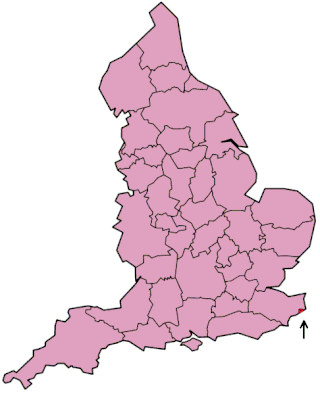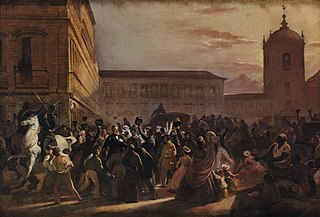A citizen's arrest is an arrest made by a private citizen – that is, a person who is not acting as a sworn law-enforcement official. In common law jurisdictions, the practice dates back to medieval England and the English common law, in which sheriffs encouraged ordinary citizens to help apprehend law breakers.
The Port of London is that part of the River Thames in England lying between Teddington Lock and the defined boundary with the North Sea and including any associated docks. Once the largest port in the world, it was the United Kingdom's largest port as of 2020. Usage is largely governed by the Port of London Authority ("PLA"), a public trust established in 1908; while mainly responsible for coordination and enforcement of activities it also has some minor operations of its own.

Thames Valley Police is the territorial police force responsible for policing the Thames Valley, covering the counties of Berkshire, Buckinghamshire and Oxfordshire in South East England. It is the largest non-metropolitan police force in England and Wales, covering 2,218 square miles (5,740 km2) and a population of 2.42 million people.

Carjacking is a robbery in which a motor vehicle is taken over. In contrast to car theft, carjacking is usually in the presence and knowledge of the victim. A common crime in many places in the world, carjacking has been the subject of legislative responses, criminology studies, and prevention efforts. Commercial vehicles such as trucks and armored cars containing valuable cargo are common targets of carjacking attempts. Carjacking usually involves physical violence to the victim, or using the victim as a hostage. In rare cases, carjacking may also involve sexual assault.

The West India Docks are a series of three docks, quaysides and warehouses built to import goods from and export goods and occasionally passengers to the British West Indies on the Isle of Dogs in London the first of which opened in 1802. Following their commercial closure in 1980, the Canary Wharf development was built around the wet docks by narrowing some of their broadest tracts.
False arrest, unlawful arrest or wrongful arrest is a common law tort, where a plaintiff alleges they were held in custody without probable cause, or without an order issued by a court of competent jurisdiction. Although it is possible to sue law enforcement officials for false arrest, the usual defendants in such cases are private security firms.

The Port of Tilbury Police is a non-Home Office ports police force responsible for the Port of Tilbury, and Tilbury 2 owned by the Port of Tilbury London Ltd, a subsidiary of Forth Ports plc. The force consists of a Chief of Police, Police Inspector, three Police Sergeants and ten Police Constables.
Preventive police is that aspect of law enforcement intended to act as a deterrent to the commission of crime. Preventive policing is considered a defining characteristic of the modern police, typically associated with Robert Peel's London Metropolitan Police, established in 1829. In recent years, however, British police have abandoned the idea of preventive policing in favour of "quick response".
The Thames River Police was formed in 1800 to tackle theft and looting from ships anchored in the Pool of London and in the lower reaches and docks of the Thames. It replaced the Marine Police, a police force established in 1798 by magistrate Patrick Colquhoun and justice of the peace John Harriott that had been part funded by the West India Committee to protect trade between the West Indies and London. It is claimed that the Marine Police was England's first ever police force.
Empire Cheer was a 7,297 GRT cargo ship which was built in 1943 by William Doxford & Sons Ltd, Sunderland. She was built for the Ministry of War Transport (MoWT) and completed in July 1943. After the Second World War she was sold to her managers, Sir William Reardon Smith & Sons Ltd, who renamed her Cornish City. On 8 December 1962 she suffered an engine room fire, after which she was scrapped in March 1963.
In admiralty law, barratry is an act of gross misconduct committed by a master or crew of a vessel resulting in damage to the vessel or its cargo. These activities may include desertion, illegal scuttling, theft of the ship or cargo, and any act carried out against the best interests of the shipowner.

The Christie Question was a diplomatic crisis between the British Empire and the Empire of Brazil that took place from 1862 to 1865. This quasi-conflict was named after William Dougal Christie, then the United Kingdom Ambassador to Brazil. The Aberdeen Act, which gave Britain the right to seize Brazilian slave ships and free their cargo, was the main cause behind the crisis.

The Act 39 & 40 Geo. 3. c. 87, sometimes called the Thames Police Act 1800, the Thames River Police Act 1800, the Marine Police Act or the Depredations on the Thames Act 1800, was an Act of the Parliament of Great Britain, granted royal assent on 28 July 1800. As alluded to in its long title, it amended the Thefts upon the Thames Act 1762.






